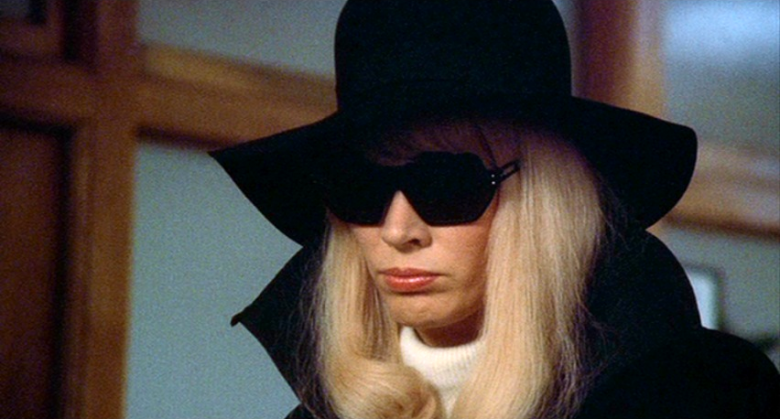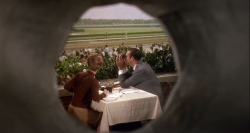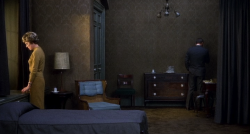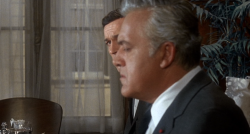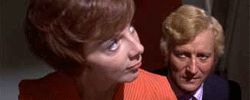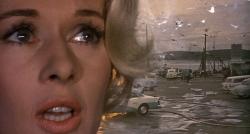Reviews
Alfred Hitchcock
USA, 1976
Credits
Review by Rumsey Taylor
Posted on 18 December 2011
Source Universal Studios DVD
Categories Late Hitchcock
Family Plot is Alfred Hitchcock’s final film. For this reason it’s doubtless considered a sort of conclusive statement, exampling Hitchcock at his most practiced and contemporary—or, more cynically, his most overripe and unfashionable. It was released in the Spring of 1976, the year following Jaws and the one preceding Star Wars, and although it bears essentially no similarity to these films its nature is summated in the one credit it shares with them—John Williams, whose playful score amplifies the fundamental discrepancy of an Alfred Hitchcock film in the 1970s. Gone is the regal etiquette of his earlier films, the brandy snifters, the reserved profanity, and a demure Grace Kelly; present are homemade hamburgers, paisley, polyester suits, and Karen Black in Stevie Wonder sunglasses.
The film opens in the middle of a seance, in which a rich, elderly woman seeks to contact her estranged son. She describes him to a medium, a doe-eyed woman many years her junior named Blanche, who relays correspondence from the spirit world in guttural whoops and shouts. This is all a performance, however, and unbeknown to her client, who doesn’t notice when Blanche devilishly peeks at her from behind a pair of hands animated by some ephemeral spirit. They are seated in the older woman’s house, in a darkened living room accentuated in marble and velvet, and if it weren’t for the medium’s fraud this scene would have the vintage self-seriousness of a Hammer film.
In exchange for information on her son, the older woman will pay Blanche a considerable bonus, and this is enough to mobilize the first of the film’s two plots. Blanche effortlessly recruits her cab driver boyfriend, George, to investigate the matter, which he does by parading as a real private investigator. Despite their fraudulence, Blanche and George have responsible pursuits, even if they seek them by means that are unethical.
As Blanche conceives a plan with George they come upon a pedestrian who crosses suddenly in front of their car. Tellingly, the scene shifts to follow this character: an outwardly mysterious woman dressed entirely in black. Her head is outfitted in sunglasses and locks of blonde hair, and her lips - which never open to permit even a single word - daubed in red. She is a thief, one so flamboyant in fashion that she is rendered immediately iconic. The scene that follows, in which the thief is given a diamond worth tens of thousands in exchange for the location of a man she has held hostage, has no apparent relevance to Blanche and George’s amateur investigation.
The bulk of Family Plot will develop these two plot lines until they are inevitably braided in conclusion. The film was scripted by Ernest Lehman, who had previously worked with Hitchcock in the same capacity on North by Northwest, a film to which Family Plot bears much resemblance. Both films pivot around a case of mistaken - or unknown - identity, and the film’s most remembered scene, when Blanche and George find their brakes have been disabled as their car careens violently down a precarious mountain highway, is akin to Roger Thornhill’s near-death experience early in the 1959 film. Aesthetically and tonally, however, their difference is perhaps best exemplified in the contrast between Cary Grant’s thorough kemptness and Bruce Dern’s Ronald McDonald haircut.
Family Plot is the closest Hitchcock would come to making outright camp, and although its plot features his characteristic interests its tone is decidedly comedic. Even when the suspense reaches climax, as in the aforementioned downhill sequence, the score and acting remain tongue-in-cheek. As the impromptu coda to not only Hitchcock’s fifty-year career but also his critically disharmonious late period, which finds some of his most political and under-appreciated work, Family Plot concludes ingeniously, with a wink.
More Late Hitchcock
We don’t do comments anymore, but you may contact us here or find us on Twitter or Facebook.



